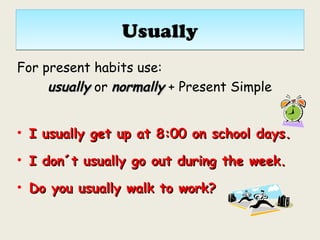
Usually used to 2
- 1. UsuallyUsually For present habits use: usuallyusually or normallynormally + Present Simple • I usually get up at 8:00 on school days.I usually get up at 8:00 on school days. • I don´t usually go out during the week.I don´t usually go out during the week. • Do you usually walk to work?Do you usually walk to work?
- 2. Used to + infinitiveUsed to + infinitive We use 'used to‘ + infinitive'used to‘ + infinitive for something that happened regularly in thehappened regularly in the past but no longer happenspast but no longer happens. • I used to smoke a packet a day but I stoppedI used to smoke a packet a day but I stopped two years ago.two years ago. • I used to drive to work but now I take the bus.I used to drive to work but now I take the bus.
- 3. We also use it for something that was true but no longer is We also use it for something that was true but no longer is • There used to be a cinema in theThere used to be a cinema in the town but now there isn't.town but now there isn't. • She used to have really long hair butShe used to have really long hair but she's had it all cut off.she's had it all cut off. • I used to like him but I don’t do itI used to like him but I don’t do it any longer.any longer.
- 4. To be used to + -ingTo be used to + -ing We use 'to be used to + -ing''to be used to + -ing' to say that something is normal, not unusual, you’resomething is normal, not unusual, you’re accustomed to itaccustomed to it. • I'm used to living on my own. I've done it for quite a long time. • Hans has lived in England for over a year so he is used to driving on the left now. • They've always lived in hot countries so they aren't used to the cold weather here.
- 5. To get used to + ingTo get used to + ing We use 'to get used to + ing''to get used to + ing' to talk about the process of something becoming normalhe process of something becoming normal for us, when you get accustomed to itfor us, when you get accustomed to it. • I didn't understand the accent when I first movedI didn't understand the accent when I first moved here but I quickly got used to it.here but I quickly got used to it. • She has started working nights and is still gettingShe has started working nights and is still getting used to sleeping during the day.used to sleeping during the day. • I have always lived in the country but now I'mI have always lived in the country but now I'm beginning to get used to living in the city.beginning to get used to living in the city.
- 6. Fill in the blanks with “usually” or “used to” I love playing tennis, and I ___________ (play) once a week these days. When I was younger I didn't ____________ (play) very often. I ______________ (spend) all my free time playing football! Now I _____________ (meet) my sister every Saturday and we play singles. I ________________ (watch) tennis on television either, but now I love Wimbledon! I ________________ (watch) all the matches but I never miss the finals! usually play use to play used to spend usually meet didn’t use to watch don’t usually watch
- 7. Fill in the blanks with “usually” or “used to” I love playing tennis, and I ___________ (play) once a week these days. When I was younger I didn't ____________ (play) very often. I ______________ (spend) all my free time playing football! Now I _____________ (meet) my sister every Saturday and we play singles. I ________________ (watch) tennis on television either, but now I love Wimbledon! I ________________ (watch) all the matches but I never miss the finals! usually play use to play used to spend usually meet didn’t use to watch don’t usually watch
